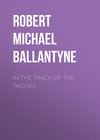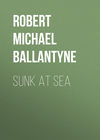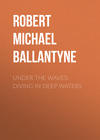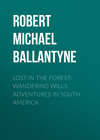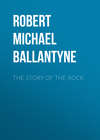Kitobni o'qish: «In the Track of the Troops»
Chapter One.
A Tale of Modern War. Reveals the Explosive Nature of my Early Career
The remarkable—I might even say amazing—personal adventures which I am about to relate occurred quite recently.
They are so full of interest to myself and to my old mother, that I hasten to write them down while yet vivid and fresh in my memory, in the hope that they may prove interesting,—to say nothing of elevating and instructive—to the English-speaking portions of the human race throughout the world.
The dear old lady to whom I have just referred—my mother—is one of the gentlest, meekest, tenderest beings of my acquaintance. Her regard for me is almost idolatrous. My feelings towards her are tinged with adoration.
From my earliest years I have been addicted to analysis.
Some of my younger readers may not perhaps know that by analysis is meant the reduction of compound things to their elements—the turning of things, as it were, inside out and tearing them to pieces. All the complex toys of infancy I was wont to reduce to their elements; I turned them inside out to see what they were made of, and how they worked. A doll, not my own, but my sister Bella’s, which had moveable eyelids and a musical stomach, was treated by me in this manner, the result being that I learned little, while my poor sister suffered much. Everything in my father’s house suffered more or less from this inquiring tendency of my mind.
Time, however, while it did not abate my thirst for knowledge, developed my constructive powers. I became a mechanician and an inventor. Perpetual motion was my first hobby. Six times during the course of boyhood did I burst into my mother’s presence with the astounding news that I had “discovered it at last!” The mild and trustful being believed me. Six times also was I compelled to acknowledge to her that I had been mistaken, and again she believed me, more thoroughly, perhaps, than at first. No one, I think, can form the least idea of the delight with which I pursued this mechanical will-o’-the-wisp.
Growing older, I took to chemistry, and here my love for research and analysis found ample scope, while the sufferings of my father’s household were intensified. I am not naturally cruel—far from it. They little knew how much pain their sufferings caused me; how earnestly I endeavoured to lessen or neutralise the nuisances which the pursuit of science entailed. But I could not consume my own smoke, or prevent explosions, or convert bad and suffocating odours into sweet smells.
Settling down to this new pursuit with intense enthusiasm, I soon began to flow in my natural course, and sought to extend the bounds of chemical knowledge. I could not help it. The particular direction in which my interest ultimately became concentrated was that of explosives.
After becoming acquainted with gun-cotton, nitro-glycerine, dynamite, lithofracteur, and other combinations of powerfully-explosive agents, I took to searching for and inventing methods by which these might be utilised. To turn everything to good account, is a desire which I cannot resist.
Explosives naturally drew my attention to mines—tin-mines, coal-mines, and other commercial enterprises. They also suggested war and torpedoes.
At that time I had not reflected on the nature of war. I merely knew it to be a science, cultivated chiefly by the human race, and that in its practice explosives are largely used. To “blow-up” effectively, whether in a literal or figurative sense, is difficult. To improve this power in war, and in the literal sense, I set myself to work. I invented a torpedo, which seemed to me better than any that had yet been brought out. To test its powers, I made a miniature fortification, and blew it up. I also blew up our groom, Jacob Lancey.
It happened thus:—
The miniature fortress, which was made of cardboard, earth, and bricks, was erected in a yard near our stables. Under its walls the torpedo was placed, and the match lighted.
It was night and very dark. I had selected the hour as being that most suitable to the destruction of an enemy’s stronghold. The match was very slow in burning. Matches invariably are so in the circumstances. Suddenly I heard the sound of footsteps. Next moment, before I had time to give warning, Jacob Lancey came round the corner of the stables with a pitchfork on his shoulder, and walked right into the fortress. He set his foot on the principal gateway, tripped over the ramparts, and falling headlong into the citadel, laid its banner in the dust. At the same instant there came a terrific flash and crash, and from the midst of smoke and flames, the groom appeared to shoot into the air!
With feelings of horror I sprang to the rescue and dragged the poor fellow from the smoking débris. He was stunned at first, but soon recovered, and then it was found that one of the fingers of his left hand had been completely blown off. Words cannot describe my feelings. I felt as if I had become next thing to a murderer. Lancey was a tall powerful man of about thirty, and not easily killed. He had received no other injury worth mentioning. Although the most faithful of servants, he was irascible, and I anticipated an explosion of temper when he recovered sufficiently to understand the nature of his injury, but I was mistaken. The blowing-up seemed to have quite cured his temper—at least as regarded myself, for when I afterwards went to see him, with a very penitent face, he took my hand and said—
“Don’t take on so, Master Jeffry. You didn’t do it a purpus, you know, and, after all, it’s on’y the little finger o’ the left hand. It’ll be rather hout o’ the way than otherwise. Moreover, I was used to make a baccy stopper o’ that finger, an’ it strikes me that the stump’ll fit the pipe better than the pint did, besides bein’ less sensitive to fire, who knows? Any’ow, Master Jeffry, you’ve got no occasion to grieve over it so.”
I felt a little comforted when the good fellow spoke thus, but I could not forgive myself. For some time after that I quite gave up my chemical and other experiments, and when I did ultimately resume them, I went to work with extreme caution.
Not long after this event I went to college, and studied medicine. My course was nearly completed when my dear father died. He had earnestly desired that I should enter the medical profession. I therefore resolved to finish my course, although, being left in possession of a small estate named Fagend, in Devonshire, and an ample income, it was not requisite that I should practise for a livelihood.
One morning, a considerable time after my studies were completed, I sat at breakfast with my mother.
“Jeff,” she said (my name is Jeffry Childers); “Jeff, what do you think of doing now? Being twenty-four, you ought, you know, to have some fixed idea as to the future, for, of course, though independent, you don’t intend to be idle.”
“Right, mother, right,” I replied, “I don’t mean to be an idler, nevertheless I don’t mean to be a doctor. I shall turn my mind to chemistry, and talking of that, I expect to test the powers of a particular compound today.”
“And what,” said my mother, with a peculiar smile, “is the nature of this compound?”
“Violently explosive,” said I.
“Ah, of course, I might have guessed that, Jeff, for most of your compounds are either violently explosive or offensive—sometimes both; but what is the name of this one?”
“Before answering that,” said I, pulling out my watch, “allow me to ask at what hour you expect Bella home to-day.”
“She half promised to be over to breakfast, if cousin Kate would let her away. It is probable that she may arrive in less than an hour.”
“Curious coincidence,” said I, “that her lover is likely to arrive about the same time!”
“What! Nicholas Naranovitsch?”
“Yes. The ship in which he sailed from St. Petersburg arrived late last night, and I have just received a telegram, saying that he will be down by the first train this morning. Love, you know, is said to have wings. If the pair given to Naranovitsch are at all in keeping with his powerful frame, they will bear him swiftly to Fagend.”
It may interest the reader at this point to know that my only sister, Bella, had been engaged the previous year to one of my dearest college friends, a young Russian, whose father had sent him to finish his education in England. My own father, having been a merchant, many of whose dealings were with Russia, had frequently visited St. Petersburg and twice my mother and sister and I accompanied him thither. While there we had met with the Naranovitsch family.
Young Nicholas was now in the army, and as fine-looking a fellow as one could wish to see. Not only was he strong and manly, but gentle in manner and tender of heart. My sister Bella being the sweetest—no, not quite that, for there is a pretty young—well, no matter—Bella being, as I may say, one of the sweetest girls in England, he fell in love with her, of course. So did she with him; no wonder! During a visit to our place in Devonshire at the end of his college career, he and Bella became engaged. Nicholas returned to St. Petersburg to obtain his parents’ consent to the union, and to make arrangements. He was rich, and could afford to marry. At the time I write of, he was coming back, not to claim his bride, for his father thought him still too young, but to see her, and to pay us a visit.
“Now you know, mother,” said I, “after the young people have seen each other for half-an-hour or so, they will naturally want to take a walk or a ride, and—”
“Only half-an-hour?” interrupted my mother, with one of her peculiar little smiles.
“Well, an hour if you like, or two if they prefer it,” I returned; “at all events, they will want a walk before luncheon, and I shall take the opportunity to show them some experiments, which prove the power of the singular compound about which you questioned me just now.”
“The explosive?”
“Yes. Its name is dynamite.”
“And what may that be, Jeff? Something very awful, I daresay,” remarked my mother, with a look of interest, as she sipped her tea.
“Very awful, indeed,” said I; “at least its effects are sometimes tremendous.”
“What! worse than gunpowder?”
“Ay, much worse, though I should prefer to say better than gunpowder.”
“Dear me!” rejoined my mother, lifting her eyebrows a little, in surprise.
“Yes, much better,” I continued; “gunpowder only bursts things—”
“Pretty well that, Jeff, in the way of violence, isn’t it?”
“Yes, but nothing to dynamite, for while powder only bursts things, dynamite shatters them.”
“How very dreadful! What is dynamite?”
“That is just what I am about to explain,” said I. “You must know, then, that it is a compound.”
“Dear, dear,” sighed my mother; “how many compounds you have told me about, Jeff, since you took to chemistry! Are there no uncompounded things—no simple things in the world?”
“Why, yes, mother; you are a simple thing, and I only wish there were a good many more simple things like you in the world—”
“Don’t be foolish, Jeff, but answer my question.”
“Well, mother, there are indeed some simple elements in creation, but dynamite is not one of them. It is composed of an excessively explosive oil named nitro-glycerine (itself a compound), and an earth called kieselguhr. The earth is not explosive, and is only mixed with the nitro-glycerine to render that liquid less dangerous; but the compound is named dynamite, in which form it is made up and sold in immense quantities for mining purposes. Here is some of it,” I added, pulling from my pocket a cartridge nearly two inches in length, and about an inch in diameter. “It is a soft, pasty substance, done up, as you see, in cartridge-paper, and this little thing, if properly fired, would blow a large boulder-stone to atoms.”
“Bless me, boy, be careful!” exclaimed my mother, pushing back her chair in some alarm.
“There is no danger,” I said, in reassuring tones, “for this cartridge, if opened out and set on fire by a spark or flame, would not, in the first place, light readily, and, in the second place, it would merely burn without exploding; but if I were to put a detonator inside and fire it by means of that, it would explode with a violence that far exceeds the force of gunpowder.”
“And what is this wonderful detonator, Jeff, that so excites the latent fury of the dynamite?”
I was much amused by the pat way in which my mother questioned me, and became more interested as I continued my explanation.
“You must know,” I said, “that many powders are violently explosive, and some more so than others. This violence of explosion is called detonation, by which is meant the almost instantaneous conversion of the ultimate molecules of an explosive compound (i.e. the whole concern) into gas.”
“I see; you mean that it goes off quickly,” said my mother, in a simple way that was eminently characteristic.
“Well, yes; but much more quickly than gunpowder does. It were better to say that a powder detonates when it all explodes at the same instant. Gunpowder appears to do so, but in reality it does not. One of the best detonators is fulminate of mercury. Detonating caps are therefore made of this, and one such cap put into the middle of that cartridge of dynamite and set fire to, by any means, would convert the cartridge itself into a detonator, and explode it with a shattering effect.
“A human being,” I continued, “sometimes illustrates this principle figuratively—I mean the violent explosion of a large cartridge by means of a small detonator. Take, for example, a schoolmaster, and suppose him to be a dynamite cartridge. His heart is a detonating cap. The schoolroom and boys form a galvanic battery. His brain may be likened to a conducting-wire. He enters the schoolroom; the chemical elements are seething in riot, books are being torn and thrown, ink spilt, etcetera. Before opening the door, the good man is a quiet piece of plastic dynamite, but the instant his eye is touched, the electric circuit is, as it were, completed; the mysterious current flashes through the brain, and fires his detonating heart. Instantly the gleaming flame shoots with lightning-speed to temples and toes. The entire man becomes a detonator, and he explodes in a violent hurricane of kicks, cuffs, and invective! Now, without a detonator—a heart—the man might have burned with moderate wrath, but he could not have exploded.”
“Don’t try illustration, Jeff,” said my plain-spoken mother, gently patting my arm; “it is not one of your strong points.”
“Perhaps not; but do you understand me?”
“I think I do, in a hazy sort of way.”
Dear mother! she always professes to comprehend things hazily, and indeed I sometimes fear that her conceptions on the rather abstruse matters which I bring before her are not always correct; but it is delightful to watch the profound interest with which she listens, and the patient efforts she makes to understand. I must in justice add that she sometimes, though not often, displays gleams of clear intelligence, and powers of close incisive reasoning, that quite surprise me.
“But now, to return to what we were speaking of—my future plans,” said I; “it seems to me that it would be a good thing if I were to travel for a year or so and see the world.”
“You might do worse, my boy,” said my mother.
“With a view to that,” I continued, “I have resolved to purchase a yacht, but before doing so I must complete the new torpedo that I have invented for the navy; that is, I hope it may be introduced into our navy. The working model in the outhouse is all but ready for exhibition. When finished, I shall show it to the Lords of the Admiralty, and after they have accepted it I will throw study overboard for a time and go on a cruise.”
“Ah, Jeff, Jeff,” sighed my mother, with a shake of her head, “you’ll never leave off till you get blown up. But I suppose you must have your way. You always had, dear boy.”
“But never in opposition to your wishes, had I? Now be just, mother.”
“Quite true, Jeff, quite true. How comes it, I wonder, that you are so fond of fire, smoke, fumes, crash, clatter, and explosions?”
“Really,” said I, somewhat amused by the question, “I cannot tell, unless it be owing to something in that law of compensation which appears to permeate the universe. You have such an abhorrence of fire, fumes, smoke, crash, clatter, and explosions, that your only son is bound, as it were, to take special delight in chemical analysis and combination, to say nothing of mechanical force and contrivance, in order that a balance of some sort may be adjusted which would otherwise be thrown out of order by your—pardon me—comparative ignorance of, and indifference to such matters.”
“Nay, Jeff,” replied my mother, gently, with a look of reproof on her kind face; “ignorance if you will, but not indifference. I cannot be indifferent to anything that interests you.”
“True; forgive me; I should have said ‘dislike.’”
“Yes, that would have been correct, Jeff, for I cannot pretend to like the bursting, smoking, and ill-smelling things you are so fond of; but you know I am interested in them. You cannot have forgotten how, when you were a boy, I used to run at your call to witness your pyrotechnic, hydraulic, mechanic, and chemic displays—you see how well I remember the names—and how the—”
“The acids,” I interrupted, taking up the theme, “ruined your carpets and table-cloths, and the smoke stifled and blinded, while the noise and flames terrified you; no, mother, I have not forgotten it, nor the patient way you took the loss of your old silk dress, or—”
“Ah! yes,” sighed the dear old lady, with quite a pitiful look, “if it had been any other than my wedding dress, which—but—well, it’s of no use regretting now; and you know, Jeff, I would not have checked you for worlds, because I knew you were being led in the right way, though, in my folly, I sometimes wished that the way had been a little further removed from smoke and smells. But, after all, you were very careful, dear boy—wonderfully so, for your years, and your little accidents did not give me much pain beyond the day of their occurrence. The poisoning of the cat, to be sure, was sad, though unavoidable, and so was the destruction by fire of the cook’s hair; but the flooding of the house, after the repairs you executed on the great cistern, and the blowing out of the laundry window at the time the clothes-boiler was cracked, with other trifles of that sort, were—”
The remainder of my mother’s speech was cut short by a clattering of hoofs.
Next moment my sister Bella came round the corner of the house at full gallop, her fresh face beaming with the exercise, and her golden hair streaming in the breeze.
She pulled up, leaped off her pony, and ran into the room. As she did so, I observed a tall, soldierly man appear in the avenue, advancing with rapid strides. Well did I know his grave, handsome face.
“Here comes Nicholas!” said I, turning round; but Bella had fled.
I observed that my friend, instead of coming straight to the room from the window of which my mother and I had saluted him, turned sharp off to the library.
I was running to the door to welcome him, when my mother called me back. I turned and looked at her. She smiled. So did I. Without uttering a word we both sat down to finish our breakfast.
“Ah! Jeff,” said my mother, with a little sigh, “how I wish you would fall in love with some one!”
“Fall in love, mother! What nonsense! How could I? No doubt there are plenty loveable girls, and there is one charming little—well, no matter—”
At that moment Nicholas entered the room, heartily saluted my mother, and cut short our conversation.
Chapter Two.
Is Still More Explosive than the First
Much to my surprise, I found that neither Nicholas Naranovitsch nor Bella nor my mother would consent to witness my experiments with dynamite that day.
As my old chum approached to greet me on the lawn before breakfast the day following, I could not help admiring his fine, tall, athletic figure. I don’t know how it is, but I have always felt, somehow, as if I looked up at him, although we were both exactly the same height—six feet one without our boots. I suppose it must have been owing to his standing so erect, while I slouched a little. Perhaps my looking up to him mentally had something to do with it.
“You’ll come to-day, won’t you?” I said, referring to the experiments.
“Of course I will, old boy; but,” he added, with a smile, “only on one condition.”
“What may that be?”
“That you don’t bother Bella with minute details.”
Of course I promised not to say a word unless asked for explanations, and after breakfast we all went to a part of the grounds which I wished to bring under cultivation. It was at that time encumbered with several large trees, old roots, and a number of boulders.
“Come along with us, Lancey,” I said to the groom, who was also my laboratory assistant, and whom I met in the stable-yard, the scene of his memorable blowing-up. “I am about to try the effect of an explosive, and wish you to understand the details.”
“Yes, sir,” replied Lancey, with a respectful touch of his cap; “I must say, sir, if you’ll allow me, I never knowed any one like you, sir, for goin’ into details except one, and that one—”
“Ah, yes, I know, that was your friend the Scotch boy,” said I, interrupting; but Lancey was a privileged servant, and would not be interrupted.
“Yes, sir,” he resumed, “the Scotch boy Sandy. We was at school together in Edinburgh, where I got the most o’ my edication, and I never did see such a boy, sir, for goin’ into—”
“Yes, yes, Lancey, I know; but I haven’t time to talk about him just now. We are going to the bit of waste ground in the hollow; follow us there.”
I was obliged to cut him short, because this Scotch hero of his was a subject on which he could not resist dilating on the slightest encouragement.
Arrived at the waste ground, we met the manager of a neighbouring mine, who was deeply learned in everything connected with blasting.
“I have brought my mother and sister, you see, Mr Jones,” said I, as we approached. “They don’t quite believe in the giant-power which is under your control; they seem to think that it is only a little stronger than gunpowder.”
“We can soon change their views on that point,” said the manager, with a slight bow to the ladies, while I introduced Nicholas as an officer of the Russian army.
“This is one of the stones you wish to blast, is it not?” said Mr Jones, laying his hand on an enormous boulder that weighed probably several tons.
“It is,” I answered.
The manager was a man of action—grave of countenance and of few words. He drew a flask from his pocket and emptied its contents, a large quantity of gunpowder, on the boulder. Asking us to stand a little back, he applied a slow match to the heap, and retired several paces.
In a few seconds the powder went off with a violent puff and a vast cloud of smoke. The result was a little shriek of alarm from my mother, and an exclamation from Bella.
“Not much effect from that, you see,” said the manager, pointing to the blackened stone, yet it was a large quantity of powder, which, if fired in a cavity inside the stone, would have blown it to pieces. “Here, now, is a small quantity of dynamite.” (He produced a cartridge about two inches in length, similar to that which I had shown to my mother at breakfast.) “Into this cartridge I shall insert a detonator cap, which is fastened to the end of a Pickford fuse—thus.”
As he spoke, he inserted into the cartridge the end of the fuse, to which was attached a small cap filled with fulminate of mercury, and tied it tightly up. This done, he laid the cartridge on the top of the boulder, placed two or three similar cartridges beside it, and covered all with a small quantity of sand, leaving the other end of the fuse projecting.
“Why the sand?” asked Bella.
“Because a slight amount of confinement is advantageous,” replied Mr Jones. “If I were to bore a short hole in the stone, and put the dynamite therein, the result would be still more effective; but the covering I have put on it will suffice, and will serve all the better to show the great difference between this explosive and gunpowder.”
“But,” said my mother, who had a tendency to become suddenly interested in things when she began to have a faint understanding of them; “but, Mr Jones, you did not give the powder fair play. If you had covered it with sand, would not its effect have been more powerful?”
“Not on the stone, madam; it would only have blown off its covering with violence, that would have been all. Now, ladies and gentlemen, if you will retire behind the shelter of that old beech-tree, I will light the fuse.”
We did as we were desired. The manager lighted the fuse, and followed us. In a few moments there occurred an explosion so violent that the huge boulder was shattered into several pieces, which were quite small enough to be lifted and carted away.
“Most amazing!” exclaimed Bella, with enthusiasm.
It was quite obvious that she had no anticipation of such a thorough result. Nicholas, too, who I may mention had no natural turn of taste for such matters, was roused to a state of inquiry.
To a question put by him, Mr Jones explained that, taking its powers into consideration, dynamite was cheaper than gunpowder, and that it saved much labour, as it would have taken two men a considerable time to have bored an ordinary blasthole in the boulder he had just broken up.
I now led the way to another part of the ground on which grew a large beech-tree, whose giant roots took a firm grasp of the ground. It was a hundred years old at least; about twelve feet in circumference, and sixty feet high. One similar tree I had had cut down; but the labour had been very great, and the removal of the stump excessively troublesome as well as costly.
Mr Jones now went to work at the forest-giant. In the ground underneath the tree he ordered Lancey to make a hole with a crowbar. Into this he pressed some cartridges of dynamite with a wooden rammer. Then the cartridge, with the detonator inside of it; and the fuse, extending from its mouth, was placed in contact with the charge under the tree. The hole was next closed up with some earth, leaving about a foot of the fuse outside. The light was then applied, and we retired to a safe distance. In a few moments the charge exploded. The tree seemed to rise from its bed. All the earth under it was blown out, and the roots were torn up and broken, with the exception of four of the largest, which were fully ten inches in diameter. A small charge of dynamite inserted under each of these completed the work, and the old giant, slowly bowing forward, laid his venerable head upon the ground.
Another charge was next placed in the soil under some loose and decayed roots, which were easily broken to pieces, so as to permit of their removal. Thus, in a short time and at little cost, were trees and roots and boulders torn up and shattered.
“But is dynamite not very dangerous, Mr Jones?” asked my mother, as we walked slowly homeward.
“Not at all dangerous,—at least not worth speaking of,” replied the manager; “nitro-glycerine by itself is indeed very dangerous, being easily exploded by concussion or mere vibration; but when mixed with infusorial earth and thus converted into dynamite, it is one of the safest explosives in existence—not quite so safe, indeed, as gun-cotton, but much more so than gunpowder. Any sort of fire will explode gunpowder, but any sort of fire will not explode dynamite; it will only cause it to burn. It requires a detonator to explode it with violence. Without its detonator, dynamite is a sleeping giant.”
“Ay, mother,” said I, taking up the subject, “the case stands thus: gunpowder is a big athlete, who slumbers lightly; any spark can wake him to violent action: but dynamite is a bigger athlete, who sleeps so soundly that a spark or flame can only rouse him to moderate rage; it requires a special shake to make him wide-awake, but when thus roused his fury is terrific, as you have just seen. And now,” I added, as we drew near the house, “we will change the subject, because I have this morning received two letters, which demand the united consideration of our whole party. I will therefore call up Bella and Nicholas, who have fallen behind, as usual. Mr Jones will excuse my talking of family matters for a few minutes, as replies must be sent by return of post.”
I then explained that one of the letters was an invitation to me and my mother and sister, with any friends who might chance to be visiting us, to go to Portsmouth to witness a variety of interesting experiments with torpedoes and such warlike things; while the other letter was an offer by a friend, of a schooner-built yacht for a moderate sum.
“Now, Nicholas,” said I, apologetically, “I’m sorry to give you such an explosive reception, but it cannot be helped. If you don’t care about torpedoes, you may remain here with my mother and Bella; but if you would like to go, I shall be happy to introduce you to one or two of my naval friends. For myself, I must go, because—”
“We will all go, Jeff,” interrupted Bella; “nothing could be more appropriate as a sequel to this morning’s experiments. A day among the torpedoes will be most interesting, won’t it?”
She looked up at Nicholas, on whose arm she leaned. He looked down with that peculiar smile of his which seemed to lie more in his eyes than on his lips, and muttered something about a day anywhere being, etcetera, etcetera.
My mother remarked that she did not understand exactly what a torpedo was, and looked at me for an explanation. I confess that her remark surprised me, for during the course of my investigations and inventions, I had frequently mentioned the subject of torpedoes to her, and once or twice had given her a particular description of the destructive machine. However, as she had evidently forgotten all about it, and as I cannot resist the temptation to elucidate complex subjects when opportunity offers, I began:—
